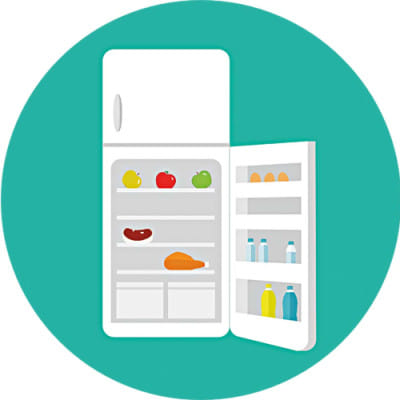Bangladesh’s next step in refrigeration

Experts have forecast that Bangladesh will become a billion-dollar refrigerator market within the next two or three years. At present, 80 percent of the market share for refrigerators is occupied by local manufacturers.
In the future, the market for refrigerators will likely experience radical change. Smart features will become commonplace. Technological innovation will allow local manufacturers to introduce smarter technology at even more competitive prices. At some point, every household in the country will own a refrigerator.
What is a smart refrigerator?
It's a programmed appliance that connects to the Internet of Things (IoT), a system of interrelated computing devices, in your home to provide additional features for you and your family, usually complemented by the use of a smart screen or a device for your refrigerator.
The IoT has opened a whole new world of possibilities for manufacturers. A smart fridge allows users to own a refrigerator that has all the cooling and freezing properties of a regular fridge, while also being connected to the internet—giving it access to features such as ice monitors, cameras, and other communication devices.
"The Internet of Things is going to give users more control over their refrigerators," says MD. Mustafizur Rahman, Additional Operative Director at Walton Hi-Tech Industries PLC. Smart IOT-based refrigeration is something Walton focuses on during product development. One of our popular products, the Non-frost WNI-6A9 features AI technology that can control the temperature of the fridge based on the environment. Users will also be able to access a food management system, which gives consumers an overview of what produce is inside their fridges."
Making food last longer
There is also a keen focus on using healthier alternatives to store food for longer periods of time. Salim Ullah Salim, Marketing Director at Jamuna Electronics said, "We use food-grade material and plastic to ensure that our refrigerators can store food for long periods of time. We are also moving away from using silicone gel as a moisture absorber in our refrigerators as it is hazardous if consumed."
SINGER Bangladesh has also put a heavy focus on food preservation by introducing a new series of refrigerators which keep fruits and vegetables fresh called "Fresh-O-Logy" and "NutriLock".
Fresh-O-Logy is an innovative technology that helps keep fruits and vegetables fresh for up to 20 days. This is accomplished by intelligent monitoring, and controlling both the air temperature and humidity inside the storage drawer for vegetables and fruits.
On the topic of food preservation, Electro Mart has also made some innovations. Nurul Afser, Deputy Managing Director at Electro Mart said, "We use active-carbon technology in all our products to prevent the smell of the different kinds of food in a refrigerator from mixing with each other. We also use a vitamin-fresh technology which keeps fruits and vegetables fresh for up to 20 days."
Design and functionality
So, what will refrigerators look like in the near future? Will it be radically different from today's boxed-shaped kitchen appliance?
Innovations aside, the existing minimal design is the staple of the industry, as it helps ensure energy efficiency. Anika Rahman, Product Manager at Samsung Bangladesh said, "Samsung is focusing on a minimal design philosophy, as these are usually a cost-effective alternative for most customers."
There is also a lot of discussion on how to further enhance a fridge to give a better experience in the kitchen. To this end, Electra Refrigerators are using a glass door design for many of their products. Muhammad Mubarok Hossain, General Manager of Sales and Marketing at Electra International Limited said, "We have decided to use the glass door design as they are not only attractive, but are also easier to clean, organise and stock. Our expectation is to capture the mid-range consumers through quality products, attractive design and durability, and by also providing smart features that are environmentally friendly."
Samir Muhammad Saleh, Chief Operating Officer, RANGS eMart, the distributor of high-end models of Samsung, Hitachi, LG, Toshiba, Hisense, Panasonic, said, "One unique feature with our products is that people can see food stored inside through the outer glass door. In addition, these refrigerators have 'hygiene fresh' technology, with UV lights that ensures a four-stage air purification process. This also acts to kill and prevent bacteria."
The era of inverter compressors
In terms of underlying technology, the industry expects the compressor technology to continue to hold sway for the coming decades. Within the existing compressor technology, the use of inverter compressors is slowly starting to become an industry standard.
When talking about the future of refrigeration technology in Bangladesh, one focal point that was heavily discussed was the use of inverter compressors. Over at Walton, they are already working on setting up a new factory in Chandra, Gazipur which will solely manufacture inverter compressors for local refrigerators.
Compared to a regular compressor, an inverter compressor has several benefits:
Energy efficiency:
As opposed to a regular compressor, the inverter compressor runs more consistently and at controlled speeds, which means it uses significantly less energy.
Durability:
Compressors experience the most wear and tear during the "start-up" period. As refrigerators with inverter compressors "start-up" slowly, they experience less wear and tear, compared to a regular compressor. This extends the lifespan of a refrigerator while simultaneously reducing the customer's cost on maintenance.
Freshness:
As the inverter compressor doesn't completely stop, only slowing down in between cycles, the temperature in the refrigerator is maintained, which means a better storage condition for your food.
Quiet operation:
Due to its constant operation, an inverter compressor also produces less noise.
Inverter compressors are set to become the industry standard, and it's clear to see why that may be the case. There's no other technology available at present that can even compete with inverter compressors.
There are newer thermal electric chips that are slowly entering the market, but the use of such chips is still not as widespread as the compressor technology, due to inherent technical issues.
Improved energy efficiency
Today, fridges are 60 percent more energy-efficient than they were 10 years ago. The top-of-the-line refrigerators only consume around 0.2 kilowatts of energy per hour.
While on the topic of energy efficiency and refrigerators, the R600a gas needs to be mentioned. Refrigerators that use R600a are much more energy-efficient and environmentally friendly. This gas also doesn't adversely affect the ozone layer.
SINGER Bangladesh's Senior Manager of Marketing & Communications Raziur Rahman stated, "We introduced R600a gas technology in our refrigerators around seven years ago, and this has since been adopted by the industry at large."
Most developed countries around the world have been using R600a for a long time now. The use of this gas has been increasing all over the world, including Bangladesh. Walton Bangladesh has also been using R600a as an alternative gas for some of their refrigerator line.
There is the possibility that we will reduce energy consumption by another 50 percent within the next 10 years, possibly even more. This could happen due to current developments being made on the cooling systems and the continuous improvements of compressors.
The local refrigerator market is estimated to keep growing, with units sold numbers estimated to reach as high as 50 Lacs. With local brands taking control of the market, refrigerator prices will continue to grow more competitive. The future of refrigeration in Bangladesh seems bright at the moment.

 For all latest news, follow The Daily Star's Google News channel.
For all latest news, follow The Daily Star's Google News channel. 





Comments